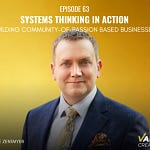What does it take to unlock capital in a system full of red tape, landmines, and outdated institutions? In this episode of The Value Creators Podcast, Hunter Hastings is joined by Dave Kotter, CEO of Integrity Capital and founder of the Hybrid Debt Fund. Dave pulls back the curtain on commercial real estate financing, innovative lending structures, and how technology—especially AI—is transforming capital flows.
From high-net-worth investors to B2B borrowers, Kotter explains why relationships are the key product, not interest rates. He shares how Integrity Capital designs financing that works for the future—faster, more flexible, and centered on the entrepreneur.
Key insights include:
How to unlock capital through advisory-based lending models
How debt innovation is reshaping the role of banks
How AI, alternative platforms, and decentralization are democratizing investment
Whether you’re raising funds, deploying capital, or building a financing venture, this is an essential guide to value creation in the modern financial ecosystem.
Resources:
Learn What They Didn’t Teach You In Business School: The Value Creators Online Business Course
Learn more about Integrity Capital
Learn more about Hybrid Debt Fund
Connect with Dave Kotter on LinkedIn
Connect with Hunter Hastings on LinkedIn
Subscribe to The Value Creators on Substack
Knowledge Capsule
1. Capital Access Is a Value Creation Lever
Entrepreneurs seeking debt capital often default to banks without exploring better options.
Integrity Capital serves entrepreneurs as a centralized access point to those other smarter lending options.
This advisory lending service opens doors that would otherwise remain closed.
2. Simplicity Wins in a Complex World
Commercial real estate financing is filled with nuance and variation.
Kotter’s mission is to reduce friction through clarity and experience.
Strategic simplicity earns client trust and facilitates execution speed.
3. Value Creation Starts with Proactive Structuring
Most loans fail because risks weren’t properly anticipated upfront.
Kotter’s team identifies “landmines” before they explode.
Strategic foresight turns complexity into competitive advantage.
4. Valuation Is a Deal-Maker—or Breaker
Appraisal mismatches can kill a deal.
Integrity Capital works with clients to prepare valid valuation narratives.
Micro-market realities must guide macro-level assumptions.
5. Every Deal Is Personal and Hyper-Customized
There’s no “one-size-fits-all” in real estate lending.
Institutional wisdom—developed through experience—adds unseen value.
Success depends on seeing what others miss.
6. Hybrid Debt: The Best of Debt and Equity
The Hybrid Debt Fund offers higher leverage with equity-like upside.
Borrowers can avoid raising excess equity while keeping control.
Investors gain steady returns with participation in profits.
7. Relationships Are the Real Product
Deals succeed or fail based on people, not just terms.
Kotter emphasizes matching the right people to the right capital.
The role of facilitator is as much human as financial.
8. AI Is Transforming Underwriting and Efficiency
AI tools speed up due diligence and eliminate bottlenecks.
Kotter’s team built proprietary AI systems to rate deals in minutes.
Automation reduces overhead while improving response time.
9. Innovation in Financial Services Is Just Beginning
Antiquated processes like SBA lending are ripe for disruption.
Fintech is democratizing investment and removing gatekeepers.
Custom-built tools challenge legacy institutions to evolve or lose relevance.
10. Rolling Recession Demands Adaptive Strategy
Kotter sees today’s market as a “rolling recession,” not a binary one.
Cycles are inevitable—resilience comes from reflection and realignment.
Hard times are opportunities for relationship-building and innovation.
11. Democratization of Capital Is Accelerating
Access to alternative investments is no longer exclusive to elites.
Technology allows individuals to participate with as little as $25K.
Legacy institutions face existential pressure from agile upstarts.
12. Strategy Must Precede Technology
Tools like AI and CRMs must follow clear strategic intent.
Executives must define needs before adopting solutions.
Discernment—not shiny software—is the real competitive edge. The human factor remains the most important.










Share this post